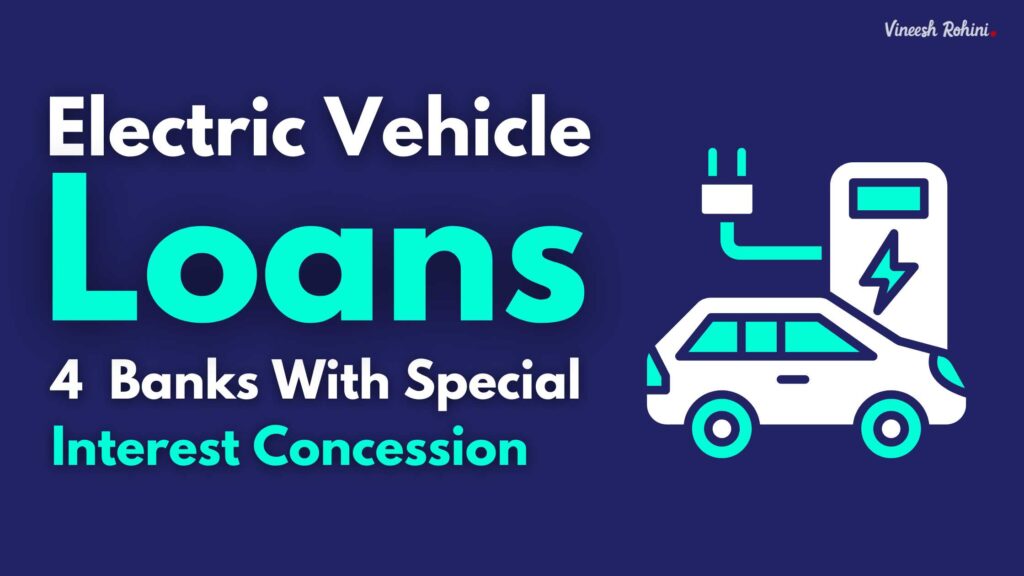Electric Vehicle Loans : 4 Public Sector Banks Offering Special Interest Concession On Electric Vehicle Loans – Comprehensive Guide

Electric Vehicle Loans: The global push towards sustainable practices and environmental conservation has spurred various nations, including India, to adopt measures that promote the use of electric vehicles (EVs). As part of a comprehensive strategy, the Indian government has not only introduced tax exemptions but has also collaborated with public sector banks to offer special interest concessions on loans for purchasing electric vehicles.
Table of Contents
This essay will delve into the details of four prominent public sector banks—State Bank of India (SBI), Union Bank of India, Punjab National Bank (PNB), and Bank of Maharashtra—that are contributing to the promotion of EV adoption through their attractive loan schemes.
Electric Vehicle Loans

State Bank of India (SBI):
SBI, being the largest commercial bank in India, plays a pivotal role in facilitating the transition towards electric mobility. The SBI Electric Vehicle Loan stands out by offering up to 25 basis points (0.25%) lower interest rates compared to regular car loans. Interest rates for SBI Green Car Loans range from 8.75% to 9.45% for electric cars. Furthermore, SBI provides flexible financing options, offering 100% loans for select models and up to 90% for other electric vehicles. In a generous move, the bank has temporarily waived the loan processing fee until January 31, 2024, as part of a festive offer.
Union Bank of India:
Union Bank of India is a key player in supporting the EV revolution with its ‘Green Miles’ initiative. The bank offers competitive interest rates ranging from 9.15% to 12.25%, dependent on the customer’s credit score. Notably, Union Bank does not impose penalties for the full repayment of loans before maturity, providing flexibility for borrowers. This move reflects the bank’s commitment to encouraging the adoption of electric vehicles by alleviating financial constraints on consumers.
Punjab National Bank (PNB):
PNB has introduced a dedicated scheme named ‘PNB Green Car’ to promote electric vehicle loans. Under this initiative, the bank offers an attractive interest rate of 8.75% for floating-rate loans linked to the current repo rate and 9.75% for fixed-rate loans. Importantly, PNB sanctions loans covering the entire ex-showroom price of the electric vehicle. As an additional benefit, the bank does not charge any processing fee or documentation charges, making the financing process more accessible to potential EV buyers.
Also Read… Car Loan : Planning to Buy a car? A Few Things Can Save You Money – Comprehensive Guide 2024
Bank of Maharashtra:
Bank of Maharashtra actively contributes to the sustainable transportation agenda by offering electric vehicle loans with distinct advantages. Notably, the bank does not levy processing or documentation charges on EV loans. Furthermore, the interest rates for electric cars are 0.25% lower compared to the existing ‘Maha Super Car Loan’ scheme, which ranges from 8.8% to 13% based on individual CIBIL scores.
Buy Now : Trading Mega Bundle – Become a Trading Expert
This demonstrates the bank’s commitment to incentivizing the adoption of eco-friendly transportation alternatives.
Conclusion:

The collaborative efforts between the Indian government and public sector banks have created a conducive environment for the widespread adoption of electric vehicles. The initiatives undertaken by State Bank of India, Union Bank of India, Punjab National Bank, and Bank of Maharashtra not only make electric vehicles more financially accessible but also reflect a collective commitment towards sustainable and eco-friendly transportation.
As the nation continues to prioritize environmental consciousness, such measures play a crucial role in steering India towards a greener and cleaner future.



